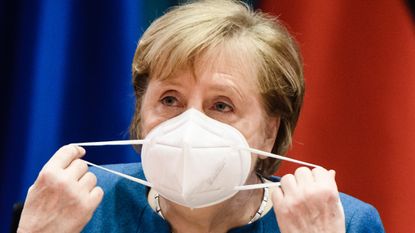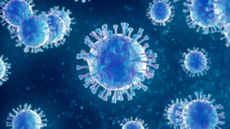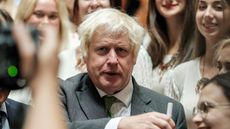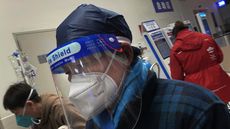Angela Merkel in talks to bring Russian Covid-19 vaccine to EU
German chancellor and Vladimir Putin discuss joint production of jab as criticism of Berlin’s vaccinations rollout intensifies

Angela Merkel has told Vladimir Putin that she is “open to the idea” of producing Russia’s Sputnik V vaccine in the EU as part of efforts to tackle widespread shortages across the continent.
Following talks between the German chancellor and Russian president, the Kremlin issued a statement saying that “issues of cooperation in combating the coronavirus pandemic were discussed, with an emphasis on possible prospects for joint production of vaccines”, Politico reports.
A spokesperson for Merkel confirmed that the chancellor had told Putin “that she is open to the idea of bilateral cooperation for the purpose of tapping European production capacities [for the Russian vaccine]”. The spokesperson added that the proposal was dependent on the European Medicines Agency giving its approval to the Sputnik V vaccine.
Subscribe to The Week
Escape your echo chamber. Get the facts behind the news, plus analysis from multiple perspectives.

Sign up for The Week's Free Newsletters
From our morning news briefing to a weekly Good News Newsletter, get the best of The Week delivered directly to your inbox.
From our morning news briefing to a weekly Good News Newsletter, get the best of The Week delivered directly to your inbox.
The talks, conducted by phone on Tuesday, come amid allegations that Germany has “bungled” the rollout of a Covid-19 vaccine, says Bloomberg.
Among those who have challenged Merkel’s strategy of ceding responsibility for procuring vaccines to the EU is Olaf Scholz, a senior member of the left-wing Social Democratic Party of Germany (SPD) and potential candidate for chancellor in September’s elections.
During a tense cabinet meeting, Scholz “presented Jens Spahn, the health minister and a member of Mrs Merkel’s Christian Democrats (CDU), with a four-page list of questions about his handling of the affair”, The Telegraph reports.
“This is about a very serious issue, whether we can properly protect the citizens of this country,” Scholz later told German television.
The row is a “clear signal that political manoeuvring has begun” ahead of federal elections later this year, says the newspaper. “But it is also a sign that the fall-out from the vaccine debacle threatens to engulf Mrs Merkel, who until now has been widely praised for her response to the virus.”
A total of 5.3 million doses of the Pfizer/BioNTech vaccine are due to be delivered to Germany by mid-February, with a further 667,000 doses due every week from the end of January.
However, this tally would still leave Germany far short of the number of doses needed to vaccinate the population, amid rising infection rates and deaths.
Create an account with the same email registered to your subscription to unlock access.
Sign up for Today's Best Articles in your inbox
A free daily email with the biggest news stories of the day – and the best features from TheWeek.com
Chas Newkey-Burden has been part of The Week Digital team for more than a decade and a journalist for 25 years, starting out on the irreverent football weekly 90 Minutes, before moving to lifestyle magazines Loaded and Attitude. He was a columnist for The Big Issue and landed a world exclusive with David Beckham that became the weekly magazine’s bestselling issue. He now writes regularly for The Guardian, The Telegraph, The Independent, Metro, FourFourTwo and the i new site. He is also the author of a number of non-fiction books.
-
 Nigeria's worsening rate of maternal mortality
Nigeria's worsening rate of maternal mortalityUnder the radar Economic crisis is making hospitals unaffordable, with women increasingly not receiving the care they need
By Harriet Marsden, The Week UK Published
-
 'Elevating Earth Day into a national holiday is not radical — it's practical'
'Elevating Earth Day into a national holiday is not radical — it's practical'Instant Opinion Opinion, comment and editorials of the day
By Harold Maass, The Week US Published
-
 UAW scores historic win in South at VW plant
UAW scores historic win in South at VW plantSpeed Read Volkswagen workers in Tennessee have voted to join the United Auto Workers union
By Peter Weber, The Week US Published
-
 Covid four years on: have we got over the pandemic?
Covid four years on: have we got over the pandemic?Today's Big Question Brits suffering from both lockdown nostalgia and collective trauma that refuses to go away
By Chas Newkey-Burden, The Week UK Published
-
 The hollow classroom
The hollow classroomOpinion Remote school let kids down. It will take much more than extra tutoring for kids to recover.
By Mark Gimein Published
-
 Excess screen time is making children only see what is in front of them
Excess screen time is making children only see what is in front of themUnder the radar The future is looking blurry. And very nearsighted.
By Devika Rao, The Week US Published
-
 Covid-19: what to know about UK's new Juno and Pirola variants
Covid-19: what to know about UK's new Juno and Pirola variantsin depth Rapidly spreading new JN.1 strain is 'yet another reminder that the pandemic is far from over'
By Arion McNicoll, The Week UK Published
-
 Long-term respiratory illness is here to stay
Long-term respiratory illness is here to stayThe Explainer Covid is not the only disease with a long version
By Devika Rao, The Week US Published
-
 Covid inquiry: the most important questions for Boris Johnson
Covid inquiry: the most important questions for Boris JohnsonTalking Point Former PM has faced weeks of heavy criticism from former colleagues at the public hearing
By The Week Staff Published
-
 China's pneumonia cases: should we be worried?
China's pneumonia cases: should we be worried?The Explainer Experts warn against pushing 'pandemic panic button' following outbreak of respiratory illness
By Keumars Afifi-Sabet, The Week UK Published
-
 Vallance diaries: Boris Johnson 'bamboozled' by Covid science
Vallance diaries: Boris Johnson 'bamboozled' by Covid scienceSpeed Read Then PM struggled to get his head around key terms and stats, chief scientific advisor claims
By The Week UK Published